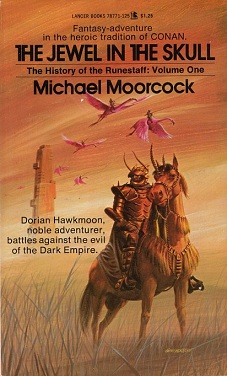
The Jewel in the Skull
Michael Moorcock
175 pages
published in 1967
The Jewel in the Skull is another of Michael Moorcock’s seemingly endless number of fantasy series, the first in the History of the Runestaff quartet. It’s also part of Moorcock’s overarching Eternal Champion mythos, with the hero, Dorian Hawkmoon, being yet another reincarnation of the Eternal Champion. Not that this is important in this book, which can easily be read as a standalone adventure. A such it fair zips along, having been published at the tail end of the era when fantasy and science fiction books were considered long if they managed 150 pages.
It’s also a very blokey book. There are only two female characters of note in it, one of which in the role of the hero’s reward, the other a damsel in distress for the hero to rescue. If you don’t notice or can live with that, the Jewel in the Skull is a clever, fun adventure story. It’s set in a far future Europe, some thousands of years after the Tragic Millennium ended our own civilisation. Much of Europe now is under occupation By Granbretan, a tyrranical empire ruled by an immortal corrupt emperor, a tightly controlled, cruel and strictly hierarchical society. Dorian Hawkmoon, the duke of Köln was the last hero to resist their advance, rising up in rebellion against them, and failed. Now he’s a prisoner in Londra, his fate to serve as entertainment for its rulers…